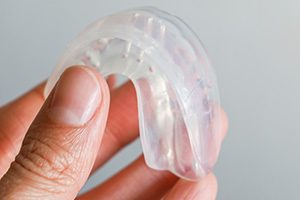Dental Implants - Powell, OH
Completely Replace Lost Teeth

Losing one or more teeth is a serious event, and one that leads to oral health problems and a damaged sense of self-confidence. If you’re struggling with gaps in your beautiful smile, please don’t hesitate – contact Wedgewood Complete Dentistry today so that we can provide you with the support and skilled care you deserve. Powell dentist Dr. Ryan Eskridge offers several reconstructive solutions, but our team strongly recommends dental implants for Powell, OH dentistry patients. This technique is a step above the rest, providing patients with valuable health benefits, long lasting strength, and a virtually seamless appearance.
Why Choose Wedgewood Complete Dentistry for Dental Implants?
- Partnered with Powell's Best Oral Surgeons
- Technologically Advanced Dental Office and Expert Dentist
- Early and Late Appointment Times for Your Convenience
What is a Dental Implant?

A dental implant is comprised of three main components: the implant post, the abutment, and the restoration. The implant post is inserted into the jaw so that it can act as a new tooth root, eventually fusing with the bone around it. Its main purpose is to serve as support for the restoration, which can be a single crown, a bridge, or even a full set of dentures. The abutment is a special piece that connects the restoration to the post.
Partnered with Powell's Best Specialists

Dental implants require a multi-step process. The implants themselves need to be surgically placed within the jawbone before they can be covered with beautiful, functional replacement "teeth." At Wedgewood Complete Dentistry, we want to make sure our patients receive the best care possible for every stage of this transformation, which is why we partner with oral surgeons and periodontists around the Powell area who are true experts at dental implant placement. These doctors will handle the surgical part of your procedure with outstanding precision and attention to detail while we stay focused on making your final restoration(s) exceptional in quality!
The 4-Step Dental Implant Process

Due to being the only tooth-replacement solution to completely rebuild missing teeth from the roots up, dental implants will involve a more extensive process compared to traditional restorations like dentures and bridges. On average, the entire dental implant treatment can take anywhere from several months to a year to complete, which is a relatively short period to wait for results that can last the rest of your life! During your initial examination, our team can give you a more accurate timeframe of the process so that you know what to expect. But if you want to know how dental implants work in Powell, here are the four main steps we take.
Initial Dental Implant Consultation

Our team will first have to verify that you’re eligible for dental implants. While most healthy people with one or several missing teeth may be qualified, your results may be unsuccessful if you have developing concerns like decay, gum disease, and insufficient jawbone density. If we discover any underlying issues that can pose a risk, we’ll make sure to address them and restore your oral health before moving forward. Once your mouth is in good condition, we can walk you through your personalized treatment plan so that you know what to expect from dental implants, including the timeline and overall price.
Dental Implant Surgery

After your initial consultation, you’ll be scheduled for surgery at a later time. To ensure a successful treatment, our team is happy to be partnered with exceptional and trustworthy oral surgeons in the Powell area. These specialists will perform your dental implant placement procedure with incredible detail and precision while we focus on crafting your high-quality final restorations!
During your appointment, your oral surgeon will make a small incision in your gum line for each dental implant you’re receiving. This will allow them to access your jawbone and place the metal posts precisely in their pre-planned locations. Once this is completed, they’ll suture your gums closed around the implants and place a protective cap over them before sending you on your way to recover.
Dental Implant Osseointegration & Abutment

While you heal over the next four to six months, your mouth will undergo a specific process known as osseointegration. This is when your dental implants fuse to the surrounding jawbone to create the stable, natural-feeling foundation for your final restorations. The recovery time may vary from patient to patient, as every case is unique.
After you’ve properly healed, you’ll come back to our office to have your abutments placed. These connector pieces will be fitted in place before you can receive your crown, bridge, partials, or full dentures. Our team will then take impressions of the area and move forward to developing your personalized restoration while your gum tissue heals over several weeks.
Delivery of Dental Implant Restoration(s)

Once we have your final restorations completed, we’ll call you back into our office for the last portion of your implant treatment. Our team will anchor your replacement tooth/teeth atop your metal posts, ensuring it fits properly and comfortably. We will take the time to confirm that your bite is balanced, you’re satisfied with the results, and to answer questions you might have before sending you on your way to show off your new and improved smile.
Benefits of Dental Implants

More than 5 million dental implants are placed by dentists in the U.S. each year. Once you understand all the benefits they come with, it is easy to see why they are so popular — they are truly the gold standard in tooth replacement. Because they rebuild missing teeth from the roots up, they provide advantages that dentures and dental bridges simply cannot offer. They have the potential to significantly improve your daily life and your health.
Day-to-Day Benefits

The benefits of dental implants in Powell for daily life include:
- Lifelike tooth replacement. A fully restored dental implant is virtually indistinguishable from a real tooth, and it feels like it’s a natural part of your mouth. Dr. Eskridge carefully designs restorations so their size, shape, and color perfectly complement a patient’s oral anatomy and facial features.
- Held firmly in place. Dental implants aren’t prone to the same slipping as traditional dentures, and since they’re a permanent part of your mouth, you never have to remove them for cleanings (depending on the type of restoration you have).
- Limitless food options. Dental implants provide a strong bite force that can stand up to virtually any food, including things like apples, corn on the cob, and tough meats.
- Easy maintenance. In many ways, caring for dental implants is similar to caring for natural teeth. You need to pay attention to oral hygiene, regularly visit your implant dentist in Powell, and avoid risky behaviors (such as playing sports without a mouthguard) that might harm your new smile.
Health Benefits

Dental implants in Powell can benefit your head-to-toe wellness! A few of the ways in which they can bolster your health include:
- Jawbone preservation. Bone deterioration in the jaw is normal after tooth loss. Dental implants stimulate the bone and help to keep it strong and whole. This preserves your facial shape and prevents the sunken look that commonly accompanies extensive tooth loss.
- Preserve natural teeth. Placing a traditional dental bridge requires that the abutment teeth be significantly modified. Dental implants are self-supporting, so they usually allow all of the remaining natural teeth to remain intact.
- Overall health advantages. Dental implants equip you to eat a balanced diet, which promotes overall health. And since they are easy to clean, they can support gum health and reduce the risk of the systemic health problems that are associated with gum disease.
Long-Term Benefits

Dental implants can continue to benefit you long after they are placed. Here are just a few ways in which they may do so:
- Save money. Although dental implants have a significant upfront price, they can last for decades. In the long-term, they may actually cost less than forms of tooth replacement that tend to fail after just a few years.
- Save time. Dental implants can spare you from spending a lot of time in your dentist’s office for denture fittings and relines. You’ll still need to attend regular checkups, of course, but you can expect most of your appointments to be very efficient.
- Low risk of complications. Studies reveal that even 10 years after placement, the vast majority of dental implants (more than 95%) are still thriving.
Are Dental Implants Right for You?

The following indications are signs that you’re a good implant candidate:
- You need to replace at least one missing tooth soon.
- Your mouth is free of gum disease and other issues that might interfere with implant placement.
- You don’t have uncontrolled diabetes or other systemic problems that can complicate the implant process.
- Your jaw has plenty of bone to support the posts.
We can discuss the viability of implants in your particular case during a consultation.

Missing Single Tooth
As you might expect, one dental implant equals one replacement tooth. Once your mouth has healed, a crown will be attached. Using implant crowns instead of dental bridges means we can fill in the empty space in your smile without having to make changes to the permanent teeth next to the gap.

Missing Multiple Teeth
A bridge doesn’t always have to rest on real teeth; it can also be supported by a pair of dental implants. We’ll likely suggest an implant bridge if you’ve lost three to four teeth in a row so that the gap can be filled with the lowest number of dental implants possible.

Missing All Teeth
Tired of your dentures coming out or needing to be refitted? You can have them permanently attached to four or six dental implants. Implant dentures have much better biting strength than traditional ones, so you will be able to enjoy tough steaks and all of your favorite meals once again.
Cost of Dental Implants

Dental implants improve your smile, your overall health, and the way you feel about yourself. And since they have such a long lifespan compared to other tooth replacement options, you can be sure that you’ll get your money’s worth. How much will you end up paying for implants in the end? During your first visit, we’ll go over the following factors with you and discuss how they apply to your personal situation.
Preliminary Treatments & Dental Implant Surgery

Sometimes gum disease therapy, bone grafts, and/or tooth extractions are needed before dental implants can be placed. Not every patient will require such treatments, but when they are deemed necessary, they need to be factored into the final cost. Dental implant surgery will have a cost of its own, of course, and if anesthesia is used during the procedure that cost might increase. Since our practice works with local specialists, you can expect the fee you pay to the surgeon to be separate from the one you pay for the final restoration; keep that in mind when planning your budget in the coming months.
The Parts of Your Dental Implant

The individual parts of the implants all have costs of their own, and the price you end up paying will be largely affected by the number of implant posts you get. The material used to make the dental implant can affect the cost as well, but it’s important to remember that cheaper is not necessarily better when it comes to this matter. We use manufacturers who make their products with reliable, long-lasting materials so that our patients can get the best results possible.
Final Dental Implant Restoration

For a single dental implant replacing one tooth, you’ll get a crown. For a pair of dental implants being used to replace several teeth in a row, a bridge is placed. For four or more implants meant to reverse extensive tooth loss, partial or full dentures are required. The kind of implant-retained restoration you get will affect the final cost, but rest assured that we will always look for the most efficient option that will allow you to replace the most teeth with the fewest implants.
Does My Dental Insurance Cover Dental Implants?

You won’t know for sure until you check with your insurance carrier. Our team can also help you review the details of your plan and help you get the most out of the available benefits. Most of the time, dental implant placement is not directly covered, but portions of the restorations might be. Also, any preliminary treatments that are part of the overall implant process (such as gum disease therapy) may be covered if they benefit your oral health.
Making Dental Implants Affordable
Wedgewood Complete Dentistry offers an in-house membership plan that grants discounts on many of our services; you can call us for details to see how this can help you save on your personalized dental implant treatment. Also, you can apply for CareCredit financing if you’re worried about paying the entire cost of implants all at once.
Maintaining & Caring for Your Dental Implants

One of the many perks of dental implants is that they are easy to maintain. So, you won’t have to worry about buying special oral hygiene products, scheduling adjustment appointments, or adopting a cumbersome dental care regimen. Instead, you can keep them in pristine condition with the same best practices you use for your natural teeth, including:
Make Oral Hygiene a Priority

Although your dental implants are crafted from materials like dental porcelain and, therefore, cannot decay, your natural teeth can decay, and your gums can develop an infection. In addition to negatively impacting the look, health, and function of your smile, this can negatively impact the look, health, and function of your dental implants. So, make sure that you make good oral hygiene habits a priority (i.e., brushing twice a day, flossing each evening, rinsing with an ADA-approved mouthwash daily).
Eat a Healthy Diet

In short, what you eat impacts your oral health. For example, if you eat hard pretzels, ice cubes, peanut brittle, and other crunchy foods, it’s only a matter of time until your restoration breaks under the pressure. Similarly, over-indulging on sugary treats, like caramel candies, can quickly lead to a cavity. That’s why we recommend enjoying snacks like these sparingly. Instead, incorporate foods into your diet that benefit your oral health, like oatmeal, scrambled eggs, white fish, bananas, and plain yogurt.
Break Bad Habits

If you bite your nails, smoke, chew on ice cubes, or use your teeth as tools to open things, it’s important that you stop. Although these habits may seem harmless, they increase your risk of dental implant failure. If you’ve had trouble quitting in the past, don’t hesitate to reach out to our Powell team for support. In addition to sharing the importance of quitting (and what can happen if you don’t), we can share what has worked for our other patients!
Protect Your Dental Implants

Avoiding crunchy foods and breaking bad habits, like smoking, will certainly go a long way when it comes to protecting your dental implants. That said, it’s important to take another precaution: wearing a mouthguard when you play sports, including non-contact ones like rollerblading and skateboarding. You should also have a custom nightguard made if you grind/clench your teeth at night to protect both your teeth and your dental implants from premature wear and tear.
Schedule Regular Dental Checkups

Finally, make sure that you schedule a dental checkup with Dr. Eskridge every six months. At each appointment, he will screen for oral cancer, tooth decay, periodontal disease, and other common problems. Plus, he will check the condition of your restoration, reducing your risk of a painful and sudden dental injury in the future. So, if you haven’t already, make sure your next biannual visit is on the calendar!
Dental Implant Failure & Salvage

Dental implants are successful in the majority of cases. In fact, they have a success rate of more than 95%! Of course, that still leaves a chance that something might go wrong. In rare instances, dental implant failure can occur, possibly due to infection or other sad circumstances. If you ever suspect that is happening to you, contact our team right away. We will evaluate the case, recommend your next steps, and do all we can to restore the health and function of both your mouth and your prosthetic teeth.
Learn More About Dental Implant Failure & Salvage
Dental Implant FAQs

Dental implants are a preferred method for replacing missing teeth. However, they are quite an investment, so it pays to be well-informed about the procedure. Here are the answers to some of the most common questions we receive about dental implants in Powell. If you don’t see the information that you’re looking for below, don’t worry. Give us a call, and we’d be happy to address any of your questions or concerns.
How Long Do Dental Implants Last?
The lifespan of dental implants typically depends on the health and lifestyle of the patient. To ensure that they last for as long as possible, it’s important to brush, floss, and rinse with mouthwash daily. Attend regular cleanings and checkups, and avoid chewing on anything too hard to sticky. With proper maintenance, implants can last for over three decades! This is several times longer than traditional bridges and dentures.
Are Dental Implants Safe?
For the majority of patients who are in good health, dental implants are very successful when placed by a qualified professional. If you have low jawbone density or gum disease, these issues will need to be addressed ahead of time to make dental implant surgery safer and more successful. If you have diabetes, cancer, or another medical condition that could make surgery or healing risky, we will discuss that with you during your consultation.
How Can I Tell If My Dental Implant Is Failing?
Common signs of dental implant failure include severe pain around the implant, inflammation of the gums, or a loose dental implant. If you notice any of these symptoms, give your dentist a call right away. By seeking immediate dental attention, your dentist will be more likely to save it.
Am I Too Young to Get Dental Implants?
Most dental professionals will not place dental implants in patients who are younger than 18. If dental implants are placed before the jaw is finished growing, it could interfere with further bone development and result in complications. Most people’s jaws aren’t fully developed until young adulthood. Some people’s jawbones don’t fully develop until they are in their mid-20s with men’s jaws usually taking longer than women’s.
Am I Too Old to Get Dental Implants?
There is no upper age limit for dental implants once you are an adult. Seniors may be more likely to have other health issues that complicate dental implant treatment. The best way to find out if you make a good candidate is to see us for a consultation. This way, we can put together a treatment plan that is right for you.



